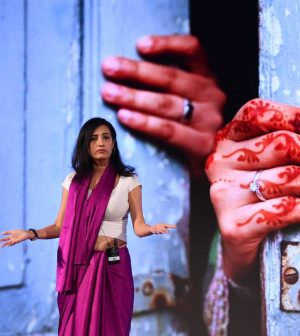- Finding Unshakable Power in a World That Wants to Pull Us ApartPosted 6 months ago
- What could a Donald Trump presidency mean for abortion rights?Posted 6 months ago
- Financial Empowerment: The Game-Changer for Women in Relationships and BeyondPosted 7 months ago
- Mental Health and Wellbeing Tips During and After PregnancyPosted 7 months ago
- Fall Renewal: Step outside your Comfort Zone & Experience Vibrant ChangePosted 7 months ago
- Women Entrepreneurs Need Support SystemsPosted 7 months ago
Women leaders driven offline and out of work by social media abuse

By Annie Banerji and Sarah Shearman | Thomson Reuters Foundation
Two years after the global #MeToo movement began, virulent online abuse of women has now pushed some out of public life
LONDON, Nov 14 – Pervasive abuse of women on social media is driving female leaders off the internet and, in some cases, out of a job, a conference heard on Thursday.
Two years after the global #MeToo movement began with women finding strength in numbers by sharing stories of sexual harassment, virulent online abuse of women has now pushed some out of public life.
Be it politicians or activists, many have called it a day and blame their digital detractors for the decision to bow out.
“Why should I go on a platform where I’m being called a bitch and a whore?” Karuna Nundy, one of India’s top court lawyers, said on the sidelines of the Thomson Reuters Foundation’s annual conference in London.
“Trolling can be extremely upsetting. It can sort of reach inside your phone, get so personal and right in your face,” said Nundy, who has stuck to her job despite years of online slander.
Former U.S. presidential candidate Hillary Clinton said this week that social media – from Facebook to YouTube – rewards abusive posts and conspiracy theories, many of them directed at high-profile women.
Her comments came after a number of female politicians said they would not stand at Britain’s Dec. 12 election, citing abuse on social media platforms that included rape and death threats.
Culture minister Nicky Morgan referenced the high levels of abuse politicians “routinely face” in her resignation letter.
An international study last year by Atalanta, a social enterprise dedicated to advancing women’s leadership, found female lawmakers were three times more likely to receive sexist comments than their male colleagues.
Given the explosion in digital hate mail aimed at women, Nundy said: “Platforms have to do something.”
Social media firms are under pressure to remove the bullies, and Twitter has promised tougher rules on online sexual harassment and stronger penalties for the trespassers, too.
Many women cannot express themselves freely on Twitter without fear of violence, Amnesty International said last year.
Twitter was not immediately available for comment.
Abuse can range from ‘doxing’ – revealing personal data such as a home address or child’s name – to posting nude pictures.
“It’s disproportionately women who experience the most vile content,” Julia Gillard, who was Australia’s first female prime minister, told the Thomson Reuters Foundation by phone.
She said the rapid growth of social media meant more women in public life were on the end of attacks.
Technology alone is not to blame, said writer and disability campaigner Sinead Burke, urging users to think twice before they post on massively popular platforms such as Facebook or Twitter.
“Yes, we can blame the platforms for their algorithms… but how do we ensure that people understand the responsibility of their own actions?” said Burke, who lives with achondroplasia, a bone growth disorder that causes dwarfism.
Burke recalled when a teenage boy leap-frogged over her while his friend shot a video of it to upload on social media “in an attempt for virality”.
“The problem is not the technology – it’s people.”
(Additional reporting by Matt Lavietes. Editing by Tom Finn and Lyndsay Griffiths. Please credit the Thomson Reuters Foundation, the charitable arm of Thomson Reuters, that covers humanitarian news, women’s and LGBT+ rights, human trafficking and slavery, property rights, social innovation, resilience and climate change. Visit http://news.trust.org to see more stories)
Our Standards: The Thomson Reuters Trust Principles.






